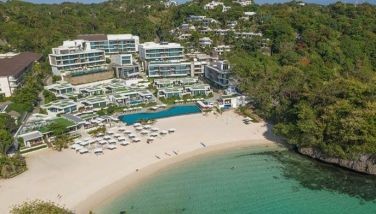RP reduces CA surplus figures
March 31, 2005 | 12:00am
The Bangko Sentral ng Pilipinas (BSP) restated yesterday the country’s current account surplus in 2004 at $2.08 billion, less than half its original figure of $5.36 billion.
A BSP bank statement said the figure had been revised to "make the compilation practices consistent with internationally-accepted recommended concepts and bring about a better analysis of external developments."
Among others, import data was adjusted "to correct the understatement of consigned raw materials for electronics exports" to show that the country’s top export, electronics, is "more import dependent than what was suggested by the old numbers."
It said the wider trade deficit impacted the balance of payments, which consequently showed a deficit of $280 million.
The bank said the new payments figure included estimates of salary remittances of Filipinos working abroad that were sent through "informal channels," thus mitigating the negative impact of the adjustment in goods imports.
Under the new system, trade credits are now based on survey and external debt reports, rather than on the previous method of deriving trade receivables and payables from data on goods shipments and payments.
However the BSP expressed optimism that the current account surplus would rise to $1.22 billion this year, with the balance of payments going into a surplus of $464 million.
As of the first two months of the year, the balance of payments stood at a surplus of $685 million compared with a deficit of $821 million recorded for the same period in 2004.
The Philippine current account surplus in 2003 was earlier given at $3.34 billion with the balance of payments surplus $111 million.
According to BSP Governor Rafael B. Buenaventura the revisions in the BOP reflected the recommendations of the International Monetary Fund (IMF) and its statistical missions on the classification, treatment and coverage of certain BOP accounts.
After the misclassification of certain import items in the controversial 2002 BOP data, Buenaventura said the BSP also adjusted the import statistics based on the proposals of the Inter-agency Committee on Trade Statistics which corrected the valuation of import of consigned electronics.
As a result of the revisions, the value of imported consigned raw materials went up. The revision also involved the inclusion of OFW remittances in kind and goods for military use to correct undercoverage.
"We have also included export of goods sold in the high seas to correct more under-coverage," Buenaventura said. "There are trades that happen in the high seas that we did not use to include for such goods as tuna and other deep sea products."
According to BSP Assistant Governor Diwa Guinigundo, the BSP has also applied a raising factor to account for OFW remittances that bypass the banking system.
"This is the first time we are going to use a raising factor to account for the remittances that go through informal channels," he explained. "In the past, the informal estimate was that about 25 to 28 percent of remittances do not go through the banking system."
To account for this, Guinigundo said the BSP will use a raising factor of 20 percent. "We decided its better to be more conservative than the usual estimate," he said. "First we factored in the anticipated increase in the funds captured by banks since they have become more aggressive in getting OFW remittances out of the informal channels."
Another critical change, Guinigundo said, was the shift in the treatment of OFW transactions based on the one-year residency rule. As a result, remittances from OFWs with contracts of less than one year abroad are classified under the income account while the remittances from long-term workers are classified under current transfers. Expenditures of seasonal workers, on the other hand, are reflected as travel imports. Guinigundo said the BSP has made adjustments in direct and portfolio investments to include transactions that bypass the banking system such as resident investments abroad. These also factor in revisions after audit and late reports. – With a report from AFP
A BSP bank statement said the figure had been revised to "make the compilation practices consistent with internationally-accepted recommended concepts and bring about a better analysis of external developments."
Among others, import data was adjusted "to correct the understatement of consigned raw materials for electronics exports" to show that the country’s top export, electronics, is "more import dependent than what was suggested by the old numbers."
It said the wider trade deficit impacted the balance of payments, which consequently showed a deficit of $280 million.
The bank said the new payments figure included estimates of salary remittances of Filipinos working abroad that were sent through "informal channels," thus mitigating the negative impact of the adjustment in goods imports.
Under the new system, trade credits are now based on survey and external debt reports, rather than on the previous method of deriving trade receivables and payables from data on goods shipments and payments.
However the BSP expressed optimism that the current account surplus would rise to $1.22 billion this year, with the balance of payments going into a surplus of $464 million.
As of the first two months of the year, the balance of payments stood at a surplus of $685 million compared with a deficit of $821 million recorded for the same period in 2004.
The Philippine current account surplus in 2003 was earlier given at $3.34 billion with the balance of payments surplus $111 million.
According to BSP Governor Rafael B. Buenaventura the revisions in the BOP reflected the recommendations of the International Monetary Fund (IMF) and its statistical missions on the classification, treatment and coverage of certain BOP accounts.
After the misclassification of certain import items in the controversial 2002 BOP data, Buenaventura said the BSP also adjusted the import statistics based on the proposals of the Inter-agency Committee on Trade Statistics which corrected the valuation of import of consigned electronics.
As a result of the revisions, the value of imported consigned raw materials went up. The revision also involved the inclusion of OFW remittances in kind and goods for military use to correct undercoverage.
"We have also included export of goods sold in the high seas to correct more under-coverage," Buenaventura said. "There are trades that happen in the high seas that we did not use to include for such goods as tuna and other deep sea products."
According to BSP Assistant Governor Diwa Guinigundo, the BSP has also applied a raising factor to account for OFW remittances that bypass the banking system.
"This is the first time we are going to use a raising factor to account for the remittances that go through informal channels," he explained. "In the past, the informal estimate was that about 25 to 28 percent of remittances do not go through the banking system."
To account for this, Guinigundo said the BSP will use a raising factor of 20 percent. "We decided its better to be more conservative than the usual estimate," he said. "First we factored in the anticipated increase in the funds captured by banks since they have become more aggressive in getting OFW remittances out of the informal channels."
Another critical change, Guinigundo said, was the shift in the treatment of OFW transactions based on the one-year residency rule. As a result, remittances from OFWs with contracts of less than one year abroad are classified under the income account while the remittances from long-term workers are classified under current transfers. Expenditures of seasonal workers, on the other hand, are reflected as travel imports. Guinigundo said the BSP has made adjustments in direct and portfolio investments to include transactions that bypass the banking system such as resident investments abroad. These also factor in revisions after audit and late reports. – With a report from AFP
BrandSpace Articles
<
>
- Latest
- Trending
Trending
Latest
Trending
Latest
Recommended




























